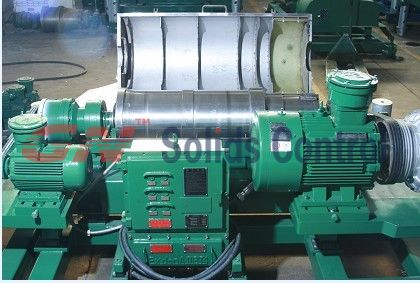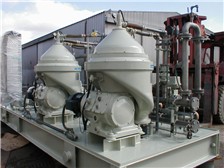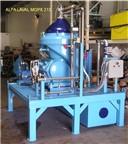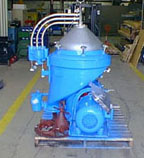Author: Oleg Tchetchel
Canada Blower Co. has developed high pressure blowers-in-series systems to achieve static pressure, previously unachievable by single stage centrifugal blowers.
Series and parallel connected blower installations are often used to meet performance ranges beyond normal single stage blower capacities. For systems that require high ststic pressure, and especially high pressure TOGETHER with high temperature (where standard multi stage, positive displacement, screw, or regenerative type blowers can not be used) series of single stage centrifugal blowers can be used. Many times additional blower in the system can be advantageous. For instance, where two blowers are operating in series and one breaks down, the other may be able to "limp" the system along while the necessary maintenance is performed. Having on blower continue in operation can often allow limited production while the other is being repaired. Also, there are cases where having one blower continue in operation could prevent or at least minimize system or equipment damage from such things as high temperature ot contaminated airstreams.
Another advantage of blowers in series is that of the availbale space. If system must be expanded and increaases the CFM requirements, the allotted space for the original blower may not be large enough for a single large blower, but might be large enough to istall two smaller blowers in series to obtain the necessary pressure.
One more potentail advatage for series operation is the likehood of initial cost savings. Although each case must be evaluated individually, it is often more economical to select two "smaller" blowers with their respectice smaller motors and drives than to select one "larger" blower to do the job.
Series connected blowers are those which have the outlet of the one blower exhausting into the inlet of another blower. By connecting blowersa in such a manner, high static pressures can be attained. This is accomplished as the second blower adds its pressure capability to the system, increasing the capacity beyond the capabilities of the first blower.
Ideally, two identical blowers installed in series would result in the same CFM at the outlet of the second blower as the inlet of the first one, and nearly twice the static pressure as that rated for either blower alone. However, some variation will result in both air flow and combined pressure because of the tendency of air to compress under pressure. A good understanding of how atnoshperic pressure and absolute temperature affect density is required. Both of these factors are involved in the proper selection of blowers. Density is directly proportional to atmospheric pressure and is inversely proportional to absolute temperature (degrees Rankine).
Caution is necessary in selecting blowers for series installtion. It is generally accepted that most pre-engineered blowers are capable of withstanding twice their catalog rated static pressure. In other words, where two blowers are installed in series the second blower housing should withstand the higher pressure. There is, however, a need for concern when the combined pressure exceeds twice the rated static pressure for one blower. In series applications involving three or more blowers, or in any system in which positive or negative pressure exists prior to the consideration of the blowers, special housing reinforcement may be necessary.
Source: Source: http://www.articlesbase.com
One more potentail advatage for series operation is the likehood of initial cost savings. Although each case must be evaluated individually, it is often more economical to select two "smaller" blowers with their respectice smaller motors and drives than to select one "larger" blower to do the job.
Series connected blowers are those which have the outlet of the one blower exhausting into the inlet of another blower. By connecting blowersa in such a manner, high static pressures can be attained. This is accomplished as the second blower adds its pressure capability to the system, increasing the capacity beyond the capabilities of the first blower.
Ideally, two identical blowers installed in series would result in the same CFM at the outlet of the second blower as the inlet of the first one, and nearly twice the static pressure as that rated for either blower alone. However, some variation will result in both air flow and combined pressure because of the tendency of air to compress under pressure. A good understanding of how atnoshperic pressure and absolute temperature affect density is required. Both of these factors are involved in the proper selection of blowers. Density is directly proportional to atmospheric pressure and is inversely proportional to absolute temperature (degrees Rankine).
Caution is necessary in selecting blowers for series installtion. It is generally accepted that most pre-engineered blowers are capable of withstanding twice their catalog rated static pressure. In other words, where two blowers are installed in series the second blower housing should withstand the higher pressure. There is, however, a need for concern when the combined pressure exceeds twice the rated static pressure for one blower. In series applications involving three or more blowers, or in any system in which positive or negative pressure exists prior to the consideration of the blowers, special housing reinforcement may be necessary.
Source: Source: http://www.articlesbase.com












